Film Composer Ramin Djawadi Returns to Berklee During Game of Thrones Tour
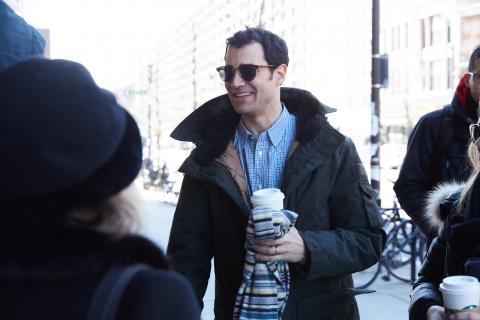
Film composer Ramin Djawadi B.M. '98 visits Berklee on March 6, 2017, during his 'Game of Thrones' concert tour.
Image by Kelly Davidson
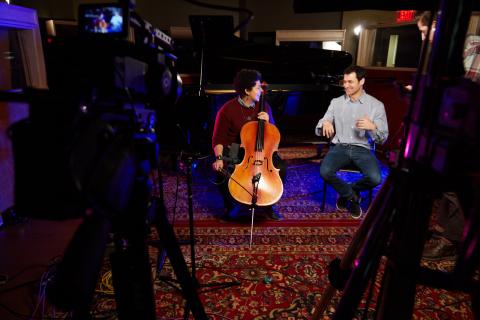
Djawadi sits with Boston Conservatory at Berklee cello student Olivia J.P. Harris during a video shoot as she plays the theme for 'Game of Thrones.'
Image by Kelly Davidson
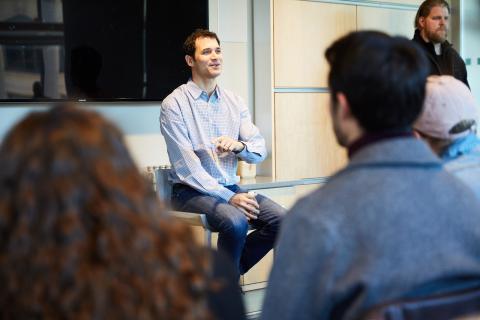
More than 60 students showed up to hear Djawadi speak. "I think the school is incredible at what they do, the work ethic they set up here and the technology they provide. All I can say to you guys is to just soak it up," he told students.
Image by Kelly Davidson
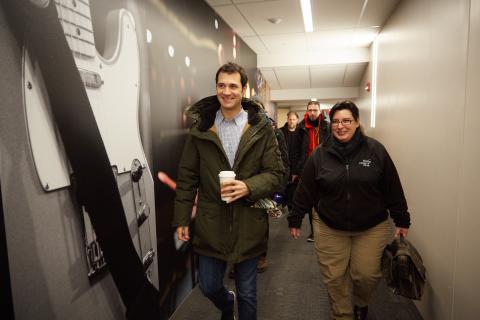
Djawadi (pictured here with Jeanine Cowen, vice president for Academic Affairs) toured the campus, including the new 160 Massachusetts Avenue building and its facilities. "It’s just mind-blowing," he said. "I’m so overwhelmed, I’m speechless. It’s so cool. I could go on and on and on about all the cool rooms and classrooms and equipment that I didn’t have when I was here. And it’s just really amazing to see that Berklee is always pushing forward and expanding.”
Image by Kelly Davidson
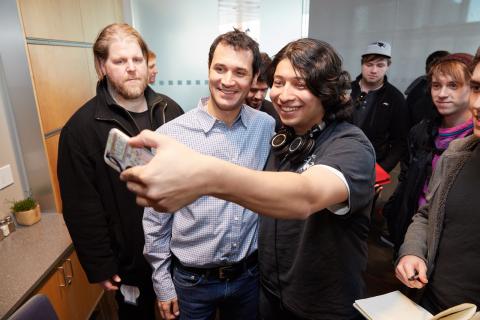
Students take photos with Djawadi after the Q and A in the Eisenson Room.
Image by Kelly Davidson

Djawadi looks out on a city he hasn't seen in 17 years, from the 160 Massachusetts Avenue building.
Image by Kelly Davidson
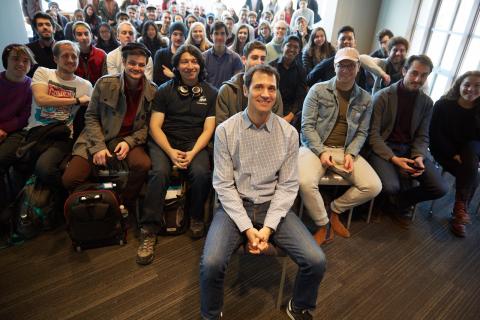
Djawadi poses with a group of mostly film scoring students on March 6, 2017.
Image by Kelly Davidson
In the winter of 2000, Ramin Djawadi B.M. '98 was just two years out of Berklee and working for a video game company in Boston when he went home to his native Germany for Christmas. There, in the course of a casual conversation, one of his friends mentioned that that knew “somebody that knows somebody that knows somebody that knows Hans Zimmer,” the famous Hollywood film scorer. Through this string of connections, Djawadi landed a gig with composer Klaus Bladel and left for Los Angeles.
Earlier this month, Djawadi returned to Boston for the first time in 17 years, in town for the nationwide tour of the music he wrote for Game of Thrones. While here he stopped by Berklee to tour the campus and to visit with students, about 60 of whom packed the Eisenson Room to get a chance to ask him questions. He also personally donated 114 tickets to the T.D. Garden concert to students and selected faculty.
Watch a video interview with Ramin Djawadi:
Below is an edited and condensed selection of questions and answers from Djawadi’s meeting with students, in which he talks about breaking into the industry, how he dealt with writer’s block, and the importance of being a good hang.
What’s your creative process like? How do you come up with new pieces?
“If I have the visual in front of me I always watch the show. I don’t write any music at first. If I have the time, I let it sit for a day or two and I just walk around. I just live life. You just kind of internalize it. And you think about it. I dream about it; that’s what I try to do. And then it usually just comes in my head. I don’t have a formula with chords of melody. While walking around, I start to think about what instruments I want to use.”
What’s the value of doing an internship that isn’t directly related to what you want to do?
“L.A. seems to be kind of old school with that. That idea of being a runner or being an intern is still being used there. And I actually personally like it because that way you get to see who has the right work attitude. Because, again, I think it’s very important to be able to get along with people. You can be as good a composer as you want to be, but if you’re not a good hang in the studio nobody wants to be around you. So it’s a way of getting to know somebody. Even being a runner shows already a lot of the qualities of who you are: Are you on time? If somebody gives you an order, do you get it right, do you listen? As silly as it sounds, I can’t even tell you how many people we’ve had where the lunch order was wrong and you have a director sitting there and that meal is missing, or that person who was supposed to be there 30 minutes before you shows up five minutes after you, which kind of sounds obvious but there are actually people who do that, and then those guys don’t get the job afterward.”
What technical skills do you look for in an assistant?
"If somebody doesn’t know everything that doesn’t mean he can’t get the job. To me, again, it’s very important that somebody is just a good hang in the studio. I keep a very small team very close around me, I’m very private. The way I write, nobody really gets to see my workflow unless you’re really close with me. So the first thing that is important to me is that somebody is just respectful, on time, all these standard things. A lot of the technical things I things I feel like you can learn because I have multiple people and that knowledge just kind of gets passed on. The big thing is: how adaptable are you? If you don’t know something, that’s okay, but then once it gets explained to you once, you should probably know it the next time.”
How do you deal with writer’s block?
"I always compare it to a sports person, like somebody that goes jogging every day. I think if you write every day it just kind of triggers that mechanic for you to be creative. I sit at my desk every day and I do something. There are other composers that have a very structured formula. I don’t have that. I don’t say to myself, ‘Today I have to write 30 seconds and I’m going to do it.’ Sometimes I write six minutes in a day, sometimes I write 20 seconds."
"But, yeah, writer’s block is hard. I’ve had it once, when I worked on Thunderbirds with Hans [Zimmer]. I wanted to impress him so much, I just wanted to do my best work ever, and I just couldn’t do it. And he would come in and say, ‘What do you got?’ and I said, ‘Nothing; I have nothing.’ Like, I would sit there for days and just throw everything out that I wrote. And I struggled so much with it. And then he sat down with me and said, ‘Look at me; it happens to all of us.’ And when I heard that from him it just kind of relieved something in me. He told me some of his stories of how he struggled and how even he still gets worried when he starts a project. And that kind somehow triggered something in me when I realized, ‘You know what? We’re all human, we all have that struggle.’ And then from then on it just kind of worked.”
What’s the best piece of advice you can give us as students and musicians?
“I think one big thing, and it might also sound obvious but maybe not always. The one thing I discovered for me is following what you really want to do. Especially in film music, there’s John Williams, the master of it all, and some people think, ‘oh, if I want to do film music I have to write like him, or I have to write like Hans,” but it’s actually more important to find your own voice… That’s what’s great about film music right now: anything works. There are guys out there who write piano concert music and there is somehow a film for them that works. And that is really what they are looking for out in L.A., people with identity. They don’t want to hire another Ramin or another Hans, they want to hire you.”
